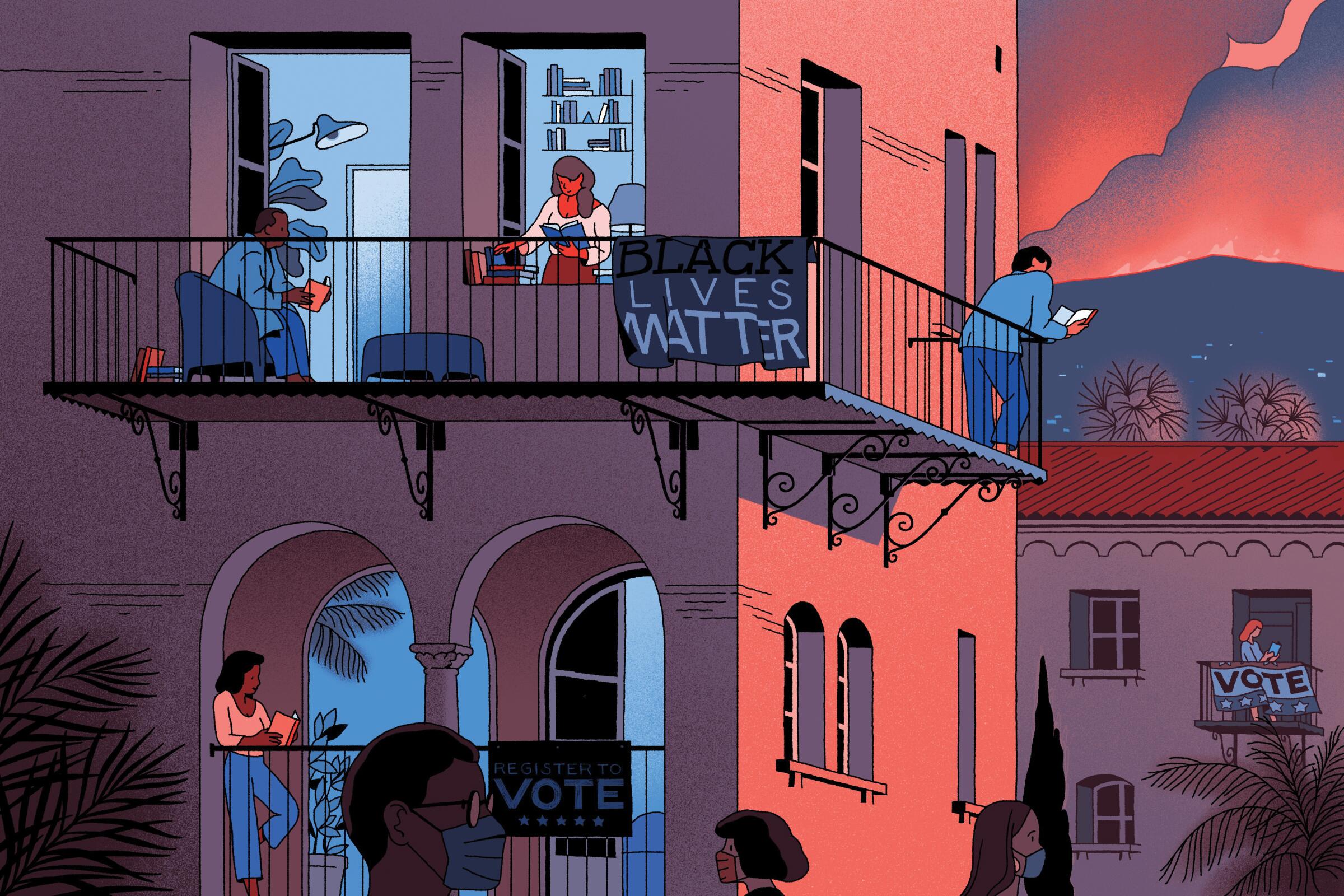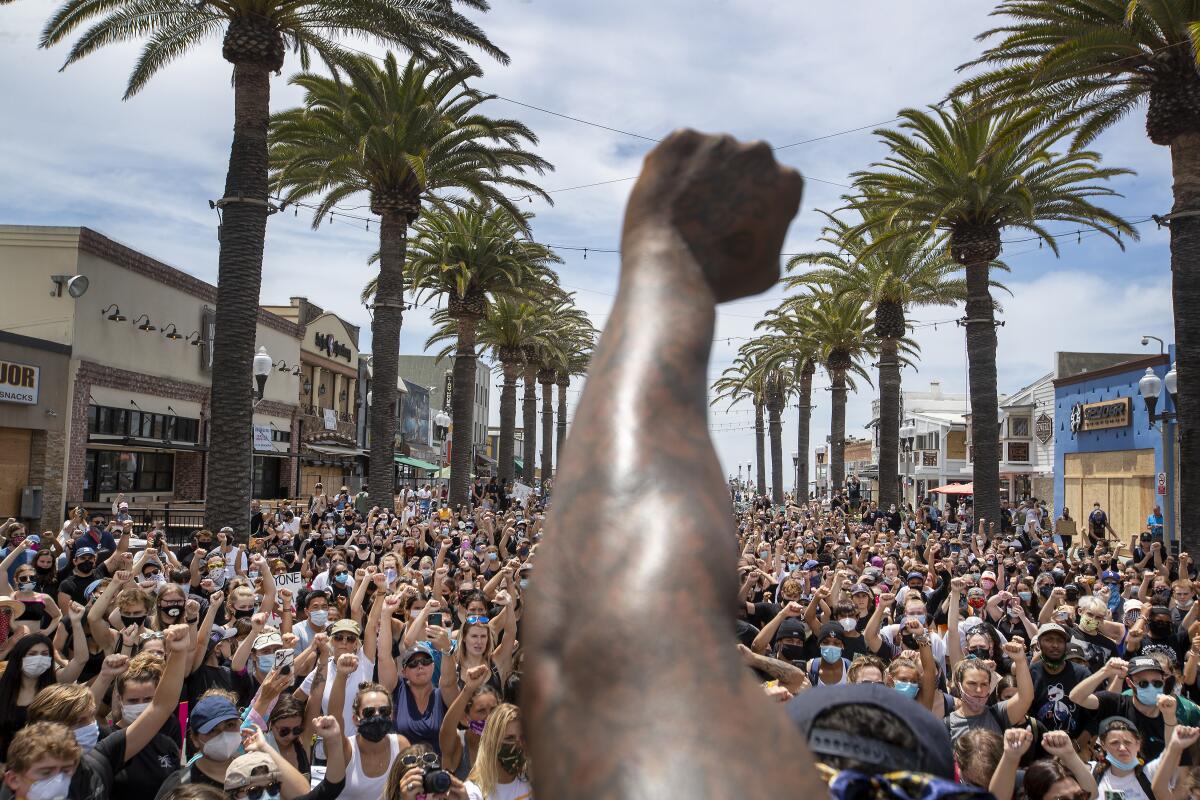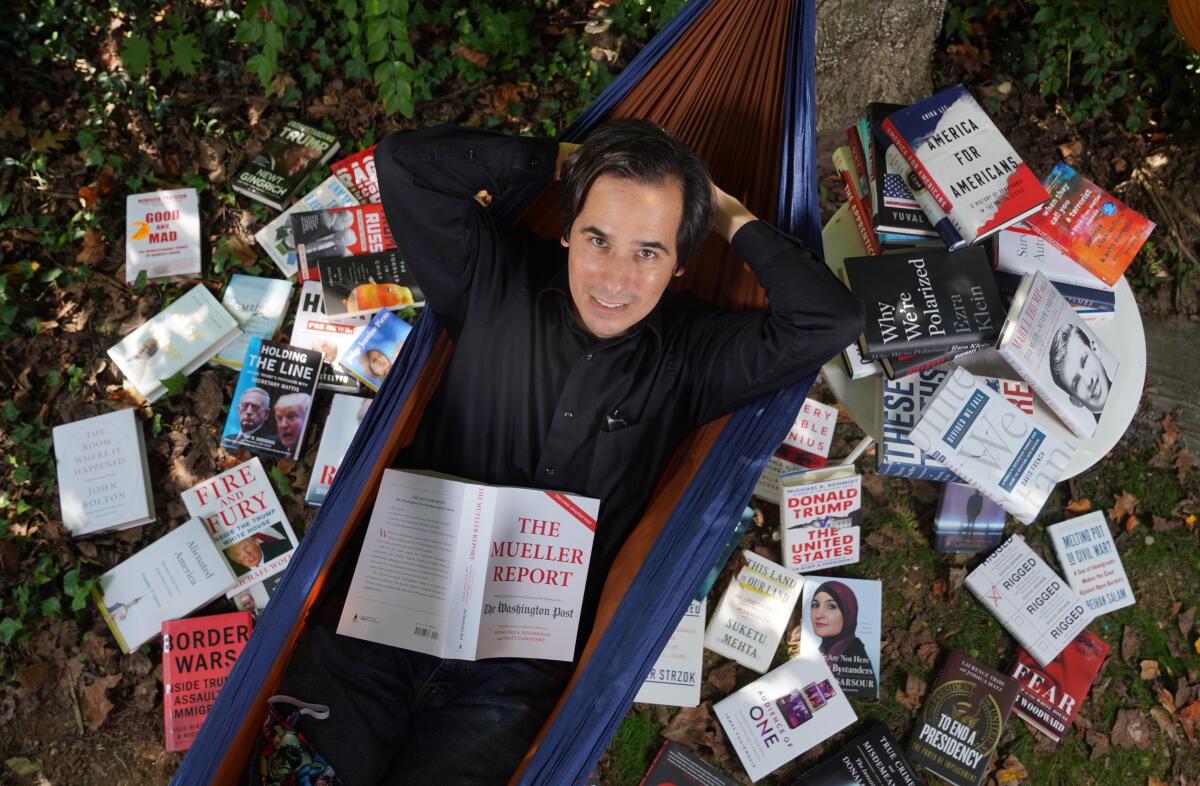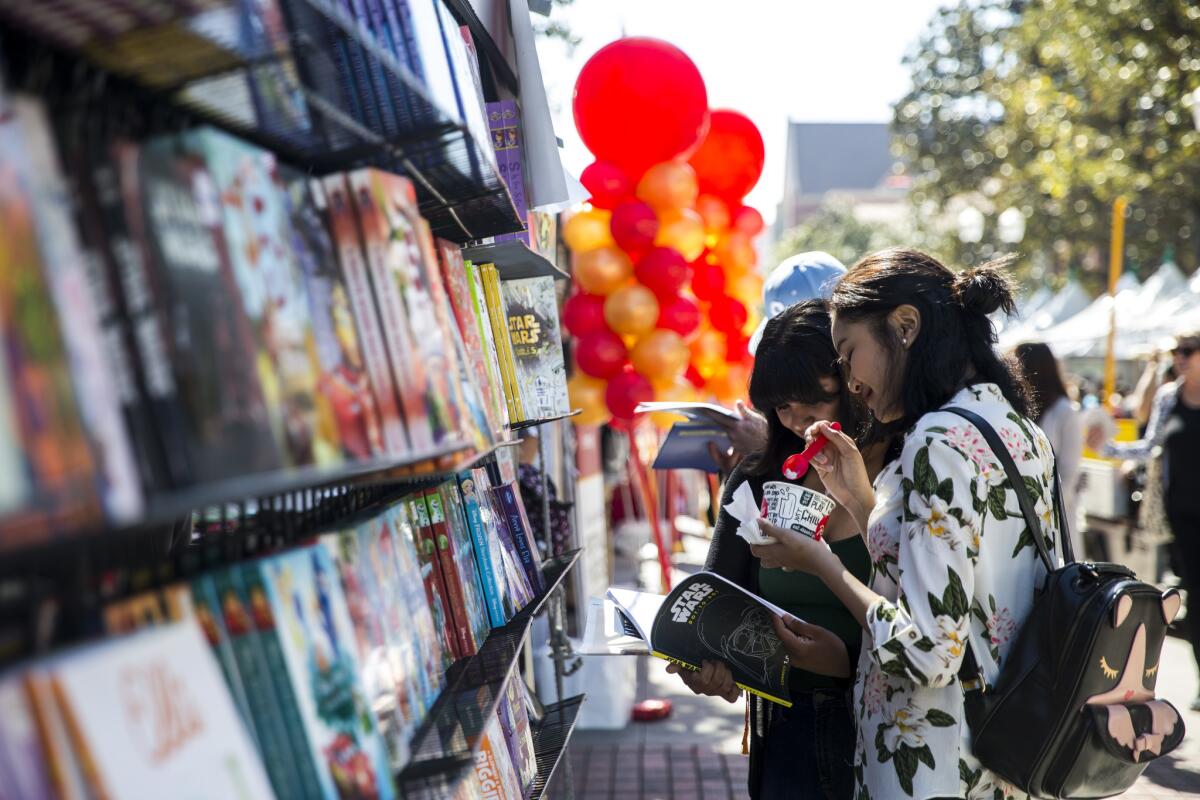Sign up for our Book Club newsletter
Get the latest news, events and more from the Los Angeles Times Book Club, and help us get L.A. reading and talking.
You may occasionally receive promotional content from the Los Angeles Times.

If aliens were to land in the U.S. tomorrow, an event that would surprise no one in 2020, they might be forgiven for concluding that the entire book industry centers on Donald Trump. There are, to be sure, far too many books on Trump. But underlying much of the fall crop are shifts that go beyond the personality quirks of the man in the White House. The struggle for racial justice; the rise of authoritarianism; the precarity of citizenship; airborne toxic events; growing economic inequality; ongoing climate destruction; the battle over which ideas are beyond the pale.
Looked at one way, it’s an unbearable litany of emergencies. But it’s also a challenge to all of us, a shoulder-shaking command: “Make sense of this!”
No other medium has yet been invented that answers this challenge better than books. In this too-eventful season, we’re exceedingly lucky to have them.
The authors gathered here have dedicated their lives not only to the art of narrative but also to the hard work of making sense. In a series of conversations, Margaret Atwood, Claudia Rankine and others discuss the world and their place in it — and yes, Carlos Lozada gleans unexpected wisdom from 150 books on Trump. Critics assess the legacy of the Reagan years, Marilynne Robinson’s novel “Jack” and the ultimate doomer Boomer, Don DeLillo.
We also meet a publisher on a lucrative crusade against cancel culture, and Pico Iyer obliterates clichés about Los Angeles through the corrective lens of The Times Festival of Books, which next week launches its first-ever virtual gathering in its 25th year. What a time to meet authors, whether online or on the page. What a time to join the collective project of trying to make sense of it all.

Claudia Rankine on Black Lives Matter, Naomi Osaka and justice for all
Uncontained fires spewing ashes and smoke across the continent — the past became prelude again. As with the killings of Latasha Harlins, Amadou Diallo, Trayvon Martin, Sandra Bland, Michael Brown and Philando Castile, Breonna Taylor and her family too were denied justice this fall. Amid renewed calls for truth, reparations and justice, award-winning poet, Yale University professor and essayist Claudia Rankine discussed her newest work, “Just Us” — an urgent talk about a timely book. Here is a condensed version of our wide-ranging conversation. READ MORE >>>
Is Trump our fault? Ayad Akhtar and Laila Lalami debate citizenship and complicity
In Laila Lalami’s “Conditional Citizens,” the Moroccan American author tells a story both sweeping and intimate about what it means to be American. It’s her first book of nonfiction, a swift intellectual history. Ayad Akhtar, who won the 2013 Pulitzer Prize for drama for his play “Disgraced,” is mirrored in the narrator of his new novel, “Homeland Elegies.” The multilayered narrative features a writer, his Trump-loving father, his disenchanted mother, the frustrations of being a broke artist and the seductions of neoliberalism. They joined The Times via Zoom to talk about their new books and more. READ MORE >>>
Margaret Atwood’s Guide to Turning Dark Histories into Fictional Futures
“The Handmaid’s Tale” provides no hint of how delightful Margaret Atwood can be in conversation. She classifies much of her work as speculative fiction, our world transformed by events that stem from our present and past. That’s how the totalitarian religious state of “The Handmaid’s Tale” came about in 1985 — and how the MaddAddam trilogy, completed in 2013, imagined a devastating pandemic. “The Handmaid’s Tale” has, of course, been adapted by Hulu, featuring Ann Dowd as the fearsome Aunt Lydia — a villain who takes on a more ambiguous role in “The Testaments,” which is out in paperback this fall. READ MORE >>>
Don DeLillo’s prescience is a mystery even to his acolytes
Don DeLillo has written about America in the 20th century so acutely and capaciously that he’s become a fixed star in our literary firmament. His novels — think “Underworld,” “White Noise” and “Libra” — pack narrative, history and ideas into each line, with dialogue that sounds like no one else’s. His work is darkly funny, though it’s hard to extract a sentence that shows it. He’s also influenced some of the smartest writers of the next generation, but — as with the humor — it can be hard to explain how. Even for people who are good at words. READ MORE >>>
Marilynne Robinson’s new novel tackles racism, but glosses over its history
The Gilead novels have been always been shaped by the disappearance of Black communities, though never as explicitly as “Jack.” Gilead is a “sundown town” — where Black people fear violence if they appear in public after dark — and this is what keeps Jack Boughton from returning, because he’s in love with a Black woman, Della Miles, and can’t bring her home. His absence has been one of the major gaps in the Gilead story, and in “Jack,” Robinson brings him squarely into view — leaving the town for the first time to investigate a life that can’t take place there. READ MORE >>>
Martin Amis on cancel culture, mourning and what Hitchens might have made of 2020
In the 1980s and ’90s, Martin Amis was a kind of enfant terrible of English letters — famous for the novels “Success” and “Money,” infamous for asking for $1 million for his memoir, “The Information.” Now we get a bookend to “The Information” — “Inside Story.” The novel is mostly a thinly veiled memoir depicting Amis’ relationships with eminent deceased writers, including Philip Larkin, Saul Bellow and especially the contrarian journalist Christopher Hitchens. Amis spoke with The Times about writing in times of crisis, cultural appropriation and what “The Hitch” would have made of President Trump. READ MORE >>>

The meta Trump book you didn’t know you needed (and wanted) to read
Don’t be alarmed by Carlos Lozada’s book “What Were We Thinking: A Brief Intellectual History of the Trump Era.” Yes, it’s a compendium of 150 books on a man we already know too much about. But they’re not all from ex-staffers with tales of White House chaos. Instead, Lozada is trying to get at something bigger — how we got here and what it means. READ MORE >>>
How Reagan and the finance bros gave us Trump
The 1980s brought with them a new social type, a sub-Nietzschean popinjay we’ll call Finance Guy. A bantam alpha, gut sucked into his chest, shoulders padded out like a linebacker, hair center-parted and pomaded back; the little creep who makes nothing but takes a fee on it anyway. The Reagan revolution had handed power — real power, the power to shape our collective fate — back to the bankers, who’d been laid low since 1929; and this, in turn, unleashed an epidemic of ridiculous self-importance. READ MORE >>>
What we got wrong in the fog of MAGA about the white working class
In July 1969, in a bar with a black-and-white television, Bob Thompson watched Apollo 11 land on the moon. One of 25,000 workers at a North American Rockwell aerospace plant, he had played a small part, spraying foam on the command module. Nursing a longneck Bud, “Bob was thinking about the moon,” writes Jim Tankersley in his book, “The Riches of This Land.” READ MORE >>>
Woody Allen’s publisher can’t be canceled
They knew it was coming. Weeks before Vanity Fair’s exposé was published, Skyhorse Publishing was prepared for the worst. And they got it. “Skyhorse Publishing’s House of Horrors,” blared the headline. In addition to questioning the publisher’s integrity, the epic takedown alleges a toxic work environment, with massive workloads, union busting, inappropriate relationships and harassment. (“The article is incorrect,” writes Skyhorse president and publisher Tony Lyons in an email. “There is no one working at Skyhorse who has been accused of harassment.”) READ MORE >>>

How Pico Iyer found L.A.’s beating heart at the L.A. Times Festival of Books
Los Angeles is the city without a heart, we used to hear when I was growing up in England, few of us having come within 5,000 miles of California. Seventy-eight school districts in search of a center, a desert car culture in which every last soul is locked inside her own four doors, a teenage wasteland: The clichés came streaming in on us as we stood in the rain at bus stops in chilly Oxford, on our way to another unheated basement. READ MORE >>
Sign up for our Book Club newsletter
Get the latest news, events and more from the Los Angeles Times Book Club, and help us get L.A. reading and talking.
You may occasionally receive promotional content from the Los Angeles Times.